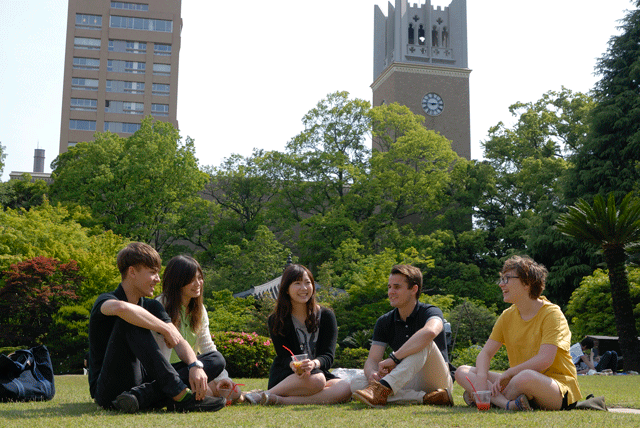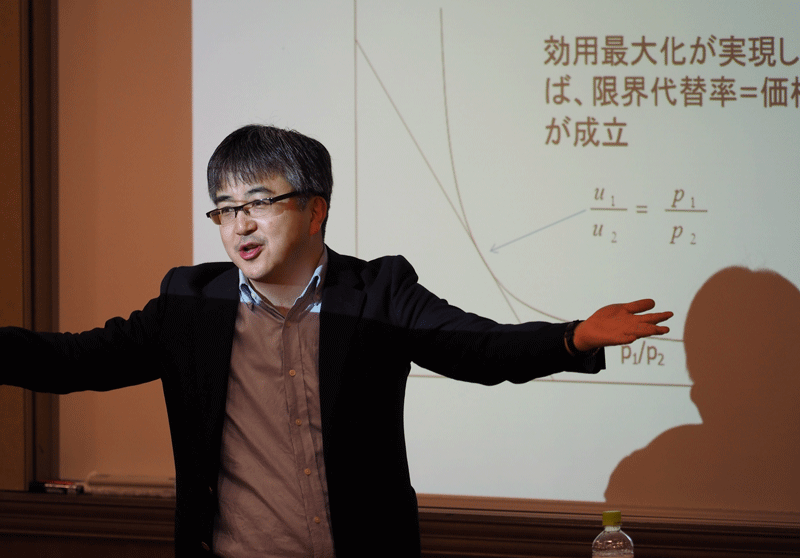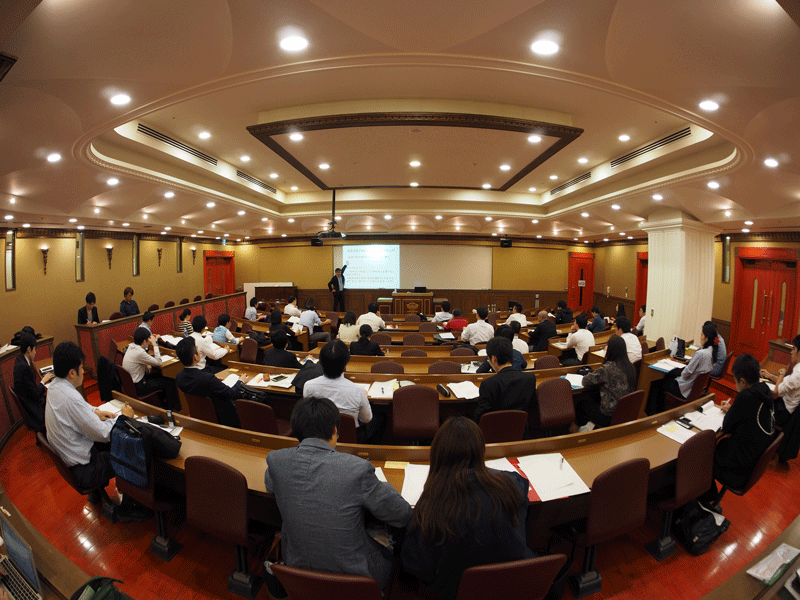Waseda’s business school is changing the way Japan does business.
For many, pursuing an MBA is a chance to open new horizons and make major steps in one’s career. It is an environment where one can acquire management skills, learn more about the ins and outs of the entrepreneurial experience from professors who have lived it, and develop one’s network of business contacts.
But it’s also a very personal decision, and one that needs to be weighed on many levels: what are the strengths and specializations of the program? Are there unique aspects to the program which I can only get here? Does the program fit my schedule? How much will it cost?
These were a few of the questions that were on our mind when we made a visit to the Waseda Business School (WBS). With roots going back to 1973, WBS has established its place as the top business school in the country. It is one of the largest programs in Japan, drawing around 200 students each year, and it also offers a considerably diverse range of MBA programs, from a full-time, two-year international MBA—offered in English and Japanese—to an evening program for people who are staying at their present jobs. In collaboration with Nanyang Technological University in Singapore, it is also a host of the innovative and prestigious Waseda–Nanyang Double MBA.
Setting a Course to Business Success
This year marks another milestone in WBS’s history, as it will be combined with the Graduate School of Finance Master’s program into new WBS. From September 2016, the new WBS will offer a full-time English-based Master of Science in Finance program, which aims to train global professionals with expertise in finance. As Kazunori Suzuki, Professor of Finance and Director of the Research Institute of Financial Studies, explained, this will bring another level of rigor to the WBS, one that will help its students learn how to think quickly, critically, and fearlessly: “One of our main focuses at the program is to help our graduates learn how to recognize connections and patterns. So we want them to get a strong background in economic and business theory, so they can quickly adapt new business models and practices when they are needed. But ultimately, it’s not just about the theory: we’re looking to help our graduates become the types of managers who will be able to question themselves as well as the theory.”
Of course, the faculty is the heart of any successful academic program, and as Professor Reiji Ohtaki pointed out, the faculty’s breadth of experience represents a particular strength of WBS. Among those leading the classrooms can be found entrepreneurs, veterans of the consulting industry, and professors with academic backgrounds in human resources, finance, and management strategy.
Ohtaki explained that one of the ways that students benefit from this breadth of teacher experience is the Seminar (a.k.a. “Zemi”) system. Throughout the MBA program, students will belong to one Zemi, led by a professor. The Zemi meets weekly for discussion and debate, allowing deeper interactions with the lead professor and fellow students in a small group setting. According to the focus of the Zemi’s lead professor, students will find themselves interviewing top Japanese CEOs about the challenges and rewards that they have experienced while helping their companies globalize, or preparing financial analyses in order to present consulting reports to a client.
These Zemi activities provide students with the opportunity to gain first-hand experience in the field, but they also allow students to experience Japanese culture in more informal, but equally informative, ways. As Ohtaki explains, the close relations fostered in the group over time result in quite a variety of different experiences: “My ‘crazy’ Zemi actually climbs to the top of Mt. Fuji every year in late July—it’s an adventure that teaches leadership as well as followership. Other professors have their Zemis do ta ue, or rice planting, with their groups, a hands-on experience that really underscores the collaborative labor that has been such a major influence on Japanese business practices.”
Diversity in the Classroom, and in the Japanese Workplace
In addition to the diverse backgrounds of its teachers, the School has attracted its share of noteworthy students, who continue to reflect well on the School after they graduate. One of them is Masami Komatsu, representative director of Music Securities, a microinvestment platform that links individual investors and local businesses. The former drummer and composer was a speaker at the World Economic Forum at Davos. Other prominent students include the third-generation head of the Hoppy Beverage Company, Mina Ishiwatari, and Yosuke Mitsusada, founding partner of Asuka Corporate Advisory.
WBS is also remarkable for the diversity of its international student population. The English-based program that begins in September is 65 percent international—many are from East Asia, but students come to its classrooms from as far afield as Uzbekistan. Almost all of them are drawn to the opportunity to learn about Japanese business culture and practice, and many of them are looking to join the Japanese workforce. As Professor Suzuki notes, this is a perfect fit with the business climate in Japan: “Given the accelerated pace of globalization, Japanese companies need more international staff at the head office level. Firms have been hiring Japanese-speaking foreigners already, and this trend is rapidly growing with MBA graduates as well. I am sure that our graduates can become key drivers of the globalization of these companies.”
And, Suzuki adds, the benefit is not just for the many international students who are drawn to the opportunity to move into rewarding positions with Japanese companies. It’s also for Japanese businesspeople as well, who stand to learn from the mindset of their international colleagues: “One of the things that the Japanese culture needs to develop is the willingness to be more confrontational and aggressive when it comes to business. I don’t necessarily like to use the word ‘fight’—of course in business, you all shake hands at the end—but it is very important to be able to express oneself, and try to lead your organization to the maximum benefit. It’s part of the idea behind Tokyo Governor Masuzoe’s initiative to revitalize the Tokyo market, and with its newly enhanced finance faculty and Master of Science in Finance program, WBS can be a part of that initiative.”
In addition to the rich offerings at Waseda, students in the international MBA program also have the opportunity to study at one of WBS’s many affiliated institutions. Many students take advantage of this worldwide network of business schools and do coursework at one of 30 different schools in Asia, Europe, and the US. In addition, the Waseda–Nanyang Double MBA has students studying in Tokyo and Singapore, earning degrees from both schools in 14 months.
WBS has accomplished much in a short time. But as an independent school, Waseda has always been able to make rapid change and reform since its founding at the end of the 19th century. And although times change, it seems that Waseda’s historical aims—producing an enlightened citizenship and leaders who would see towards the modernization of Japan—are being put into practice daily in the contemporary world of international business.
To find out more about how WBS can help you reach the next step in your professional and personal goals, visit wasedamba.jp
Welcome to Waseda University
Founded in 1882 by Shigenobu Okuma, a giant figure in the modernization of Japan, Waseda University has long been a school that encouraged its students to go against the grain and think freely. Despite—or perhaps, because of—this rebellious streak, you can find Waseda grads among the highest echelons of culture, business, and politics—alums include former Prime Ministers, CEOs of some of Japan’s top companies, academic researchers in a variety of fields, and stars of stage and screen. Year after year, it is ranked among the top universities in the country, including its business school, which dates back to 1973.
Sponsored Post











